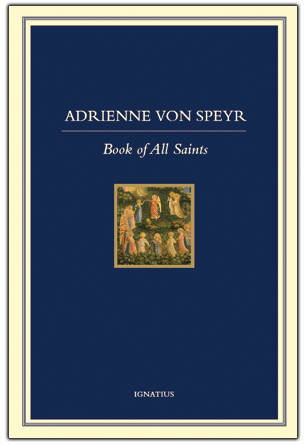![]()
![]()
![]()
![]()
"It was Pascal who said that the crisis of the modern world could be summed up by the fact that a person can no longer sit still in a room. The business (as in busy-ness) that gives rise to this situation certainly leaves little time for prayer and contemplation, a fact that has only been exacerbated by the increasing reduction of the Church’s mission to some form or other of political action. In response to this, the twin mission of Adrienne von Speyr and Hans Urs von Balthasar was to remind us of the inextricable connection between Heaven (the vertical, the contemplative) and Earth (the horizontal, the active). The very community which they founded combines the Evangelical Counsels with the secular life in order to ensure that these two realms remain together.
In David C. Schindler’s excellent translation of Adrienne’s Book of All Saints—one of her “esoteric” works—we are given a glimpse into Adrienne’s ability (a spiritual gift) to enter into the prayer lives of various saints throughout the Church’s history. As with all spiritual gifts, this one was given for the good of the whole Church, as a communion of saints. The readers of these accounts will invariably want to evaluate their own prayer lives in the light of what was helpful and not so helpful in the lives of those who have gone before. As Balthasar explains in his beneficial introduction, these essays do not stem merely from an extraordinary gift on Adrienne’s part, but also from a profound act of humility on the part of the saints themselves, who were willing to grant us—through Adrienne—a glimpse into their prayer lives. There will be surprises, but it should be remembered that these essays are not a final evaluation of the saints’ entire missions; they are merely vignettes into their manner of praying. This is a book that should itself be read prayerfully and contemplatively, rather than “curiously.” I suspect that if it is read according, it will not only benefit the faithful in their own struggle to pray in an increasingly hectic world, but also increase their awareness of the de facto communion that exists between themselves and those who have gone on to their final destination in Christ."
— Rodney Howsare , Ph.D., Associate Professor of Theology, DeSales University

